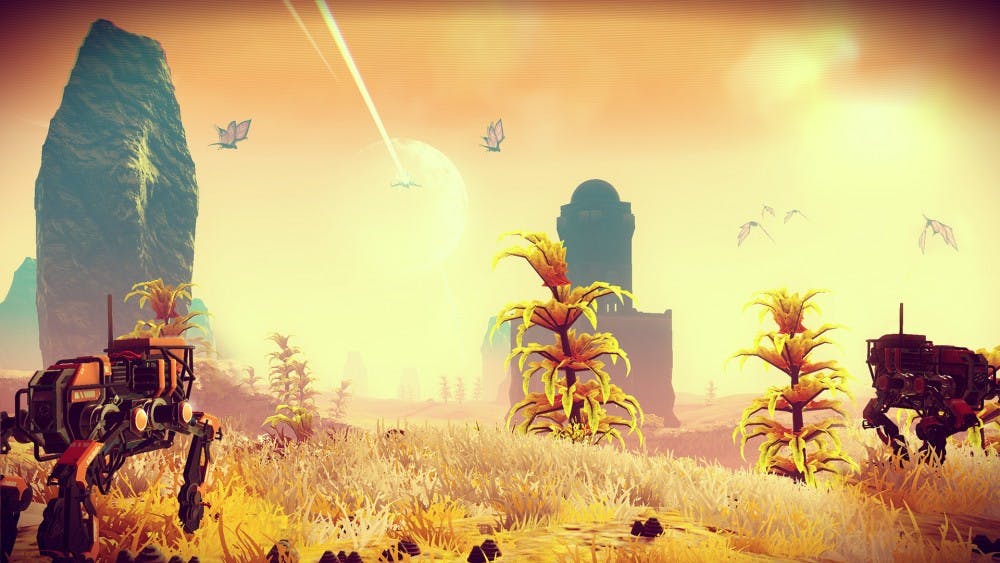Modern video game culture is built on hype. At any given moment in the comment section of a gaming site, there are people talking about being excited for an upcoming game, talking about how great the game they are playing is or, commonly, talking about how a game was a let-down and didn’t live up to their expectations.
Most recently this occurred with the highly anticipated space exploration game “No Man’s Sky.” The game was originally revealed in 2013, and from then until it was eventually released in August of this year, the game garnered a massive amount of attention. The game received financial support from Sony, was featured at their 2014 E3 conference and was covered heavily by the gaming press, including numerous interviews with Sean Murray, the managing director at Hello Games which is the studio behind the game. Murray even appeared on The Late Show with Stephen Colbert in 2015.
During these various showings, “No Man’s Sky” was shown to be a massive game that uses algorithms to create over 18 quintillion different planets for players to explore with each having unique plant and animal life to discover. This part is true, and the game we have now does have a seemingly endless series of different planets to traverse. However, many players found themselves let down. A large group of players expected the game to have an unprecedented amount of content and activities to do across its incredibly large setting and they were disappointed when the game didn’t meet their expectations – expectations that were largely built from rumors and speculation that came about in the absence of clear answers from Hello Games.
Over the course of the around two-and-a-half years from the game’s announcement to its release, many fans conjured up a growing list of expectations and hyped the game up into being something revolutionary that would change gaming forever. The game constantly received press time with major gaming sites and speculation over what players would be able to do in the game ran rampant until it became difficult to decipher what was an actual promise made by the company and what was born out of wild rumors from fans.
This pre-release hype hit its frightening climax over the summer when Hello Games announced they would have to push the game’s release back three weeks. Following this announcement, Murray took to twitter to say that he had received death threats from angry fans over the delay. Kotaku reporter Jason Schreier who simply reported on the delay also received at least one threat that shared on twitter. Clearly these extreme examples don’t come anywhere close to representing the mass gaming public, but it does highlight a basic problem that we have as consumers: We constantly overhype games.
With “No Man’s Sky,” it’s true that Hello Games wasn’t transparent about what was in their game, which can be seen by the fact that they are currently under investigation for false advertisement. The company carried out questionable marketing strategies, giving vague answers to questions about the game and going completely silent on twitter for nearly a month shortly following the release of them game when many players were voicing their frustrations. That being said, there are ways that consumers could and should take matters into their own hands and prevent themselves from falling prey to marketing speak and inflated expectations.
While I believe that companies should be held to a standard of honesty when it comes to marketing their games, I also believe there is an on us on consumers to educate themselves and make rational, informed decisions with their money. As consumers, we should do more to recognize how to see through marketing- and PR-speak and make our own assessments of games.
In the “No Man’s Sky” example, Hello Games is an incredibly small company that, on their website, lists 16 people for their entire team and whose only previous games are the “Joe Danger” games, which are simplistic side-scrolling platformers featuring a small cartoon stuntman. Between this fact and the fact that Hello Games showed the same type of gameplay footage over and over, never really answering the question of what the player would be doing in the game, there should have been alarm bells in the head of every consumer.
Instead, many gamers made speculations on what Hello Games were hiding about the game and eagerly bought the game on its release date expecting to have these expectations met. Hello Games is partially to blame for doing a poor job in addressing these issues, but I believe that if consumers had made a better attempt to keep their expectations in check, they could have waited, seen reactions from the game, and saved their $60. Also, had their expectations been properly set, they might have even been able to enjoy the game for what it really is.
The worst part is, I am guilty too. Earlier this year, I included “No Man’s Sky” in a list of “bold new games” and said that it could be a “literal game-changer” and went on to call it “the definition of a bold, new project.” In hindsight, expectations for a small indie team trying to make a game of this magnitude shouldn’t have ever been that high, and while this responsibility falls first on the actual makers and marketers of the game to portray the correct message, consumers could also do more to better their own buying choices, independent of what they are told through marketing.
The “No Man’s Sky” story is just one of many in the video game industry where expectations and reality failed to match up, and whether you are trying to speak with your wallet to make companies be more transparent with their marketing or you simply want to make sure you don’t waste your money, as a consumer, I implore you to make educated and informed decisions when dropping down money for a game.

